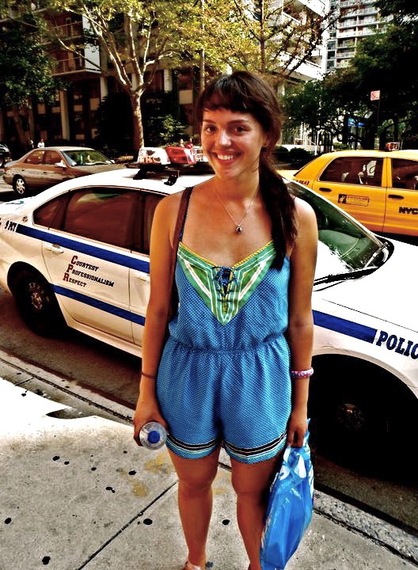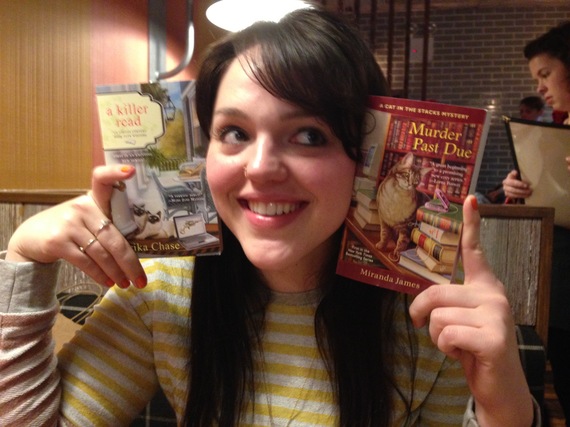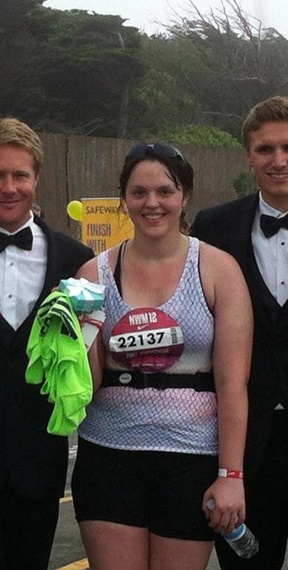
This piece was originally published on xoJane.
"Your legs look amazing. Whatever you're doing, it's working," my friend said, handing me a romper through the curtain of an Urban Outfitters dressing room.
"I'm not doing anything," I said. She scoffed, but it was the truth. Weight was melting off my body even though I was constantly eating. There was a sharp pain somewhere around my stomach that just wouldn't go away, even with two daily stops at Chipotle between meals. In the back of my mind, I knew whatever was happening wasn't good, but because I was thin (which has rarely been the case for me) -- because my outward appearance matched society's ideals -- friends, family, and doctors thought I was fine. Great, even.
There's a weird thing many women do to other women who are sick: If their illness makes them more attractive, women think, I wish I had that problem. If their illness gives them something "ugly," like acne, hair loss, or weight gain, women think, thank god I don't have that problem, or, stay away from me, I don't want to catch it. I know this because I've heard these things spoken by women of all ages, and, honestly, I've thought and said them myself. I know this, too, because I was on the receiving end of such thoughts when my health swung the direction of ugly just two years after that Urban Outfitters trip and my friend dropped me like a roaming call on Verizon.
My friend and I were the only two of our five college housemates to leave California immediately after graduating, and we both left it, coincidently, for New York City. Within our first year in the five boroughs, my friend got engaged, set a date, postponed her wedding, moved out on her own, and called off her engagement altogether. She was dating-then-not, dating-then-not her former fiancé, and I was never sure what news of their tumultuous relationship our next get-together would bring. Our other housemates were not clued in to how bad things were until they were over. I felt responsible, on behalf of everyone, to make sure she was okay as best I could. I saw her as much as possible. She stayed over at my apartment when she didn't want to be alone. We ordered food and watched bad TV every weekend. We got through it together.
I wanted to do this for her because I cared about her, but it's also not like I was doing anything above nor beyond the unspoken duties of woman-to-woman friendship. If your friend is going through a bad breakup, you drop what you're doing to help her. That's what good female friends do...Unless your friend gets to be too much of a downer and you're afraid her man-hating, mopey attitude is rubbing off on your own dating life. Then it's okay to distance yourself. Another unspoken woman-to-woman friendship rule. We have to be there for each other until it's socially appropriate to be awful to each other.
I never went awful on my friend. I stayed by her side until she got over that loser. It took a solid year and a half. It was taxing to be the only friend in the supportive role all of our housemates could have filled if she'd opened up to them, but it was especially so because I wasn't exactly doing great myself. I was exhausted and constantly hungry. I'd lost inches off every party of my body, was losing my hair in fistfuls, and had dark circles under my eyes even the fanciest Sephora products could not conceal. I got headaches, my jaw locked, my back hurt, and I started to have pretty severe panic attacks. I contributed everything to various forms of stress, including finishing my MFA and looking for a full-time job, figuring I'd feel better once my life settled into a real-world routine.
Instead I only got worse. Over the next two years, my weight ballooned up to nearly 200 lbs. I was exercising as much as I always had (training for marathons and triathlons), and eating what I'd always ate, but I had no control over my body. On my best days I was in denial, and on my worst I figured I was probably dying. I went to the top doctors in NYC, but they couldn't pin my problems on any one thing. They offered me diet pills. They told me to cut out gluten.
While I put most of my energy into fixing my health, my friend's life moved forward quickly and with ease. She started dating someone new. She made plans with me so she wouldn't make too many plans with him. She stayed over at my apartment like she did during her breakup, but now it was to keep herself busy as her new love unfolded, as to not mess it up. "I can't eat gluten now," I said. She brought me a care package of gluten-free foods. She helped me.
But this transitional period full of mutual thoughtfulness was short-lived. Things got more serious with her boyfriend. She stayed over at his place, made plans with him, called him first for things -- as anyone falling in love would do with their new significant other. The biggest downside was it left me alone more often as my health deteriorated exponentially. I was late to work almost every day because it was too hard to wake up and get dressed. I took a taxi to the subway station because it was too hard to walk to it. I stayed in because it was too embarrassing to go out.
One late-summer afternoon my friend wanted to run around Central Park, something she'd never done once and I'd done many times. I said okay though I wasn't sure I could do it. We set out for our jog, but after less than a mile I had to stop.
"You okay?" she asked.
"Yeah. Yeah, just one minute. I don't know." I was sweaty and cold. A thin coat of salt covered my arms and legs.
"What do the doctors say?"
"They don't know. It could be a million different things."
"What do you think it is?"
I paused. "I think something's growing inside me. Like, it's attacking me from inside."
I looked into my friend's eyes. They were full of pity. "If something were growing inside you, they would have found it by now."
We walked around the rest of the park, then back to my apartment. My friend left and I was alone again, hating whatever was happening to my body, hating her for doubting me, hating the isolation the unknown illness brought into my life.
My friend started to invite her boyfriend to everything we did together, and they often canceled on plans with me for plans with other couples. I canceled on plans too, because it was too hard on me physically to get to them. "I don't like making plans with you anymore," my friend said. "You're always late, or they end up not happening." My eyes glossed with tears. My fat legs busted the inseam of my pants. Something throbbed in my lower back. I had the flu for the third time in three months. I didn't say anything. My friend was looking right at me, and as sick as I was, all she saw were the ways I was disappointing her.
I stayed up that night Googling Lyme disease and various cancers. I felt insane. For a few minutes, I thought maybe I was. I panicked, I cried. I wished on every star that if the next day was only going to bring more of the same, that the next day would not come.
It took two more lonely and trying years until I was finally diagnosed with endometriosis. Like Lena Dunham and the women who wrote about their endo for a recent Lenny Letter, I didn't find a resolution for my chronic illness until I was "of childbearing age." There is no early diagnostic test for endometriosis. It doesn't show up on any sort of image. It's difficult to find and expensive to treat, because it is abnormal cell growth attacking the body, like cancer -- like what I instinctively thought and felt was happening inside of me. But without a diagnostic test nor cure, it's not considered an option for women's health problems until everything else has been ruled out. That leaves most women waiting until their mid to late-twenties to find out what the hell is wrong with them.
This adds another element to the separation that happened between my friend and me. While I was looking for, finding, and treating my reproductive disease, my friend got engaged, got married, and started talking about things like motherhood. She surrounded herself with her other friends who were also engaged, who were also getting married, who also had children on their minds. I was a sick and ugly outcast in her world of traditional female roles and dreams.
Perhaps in part because our lives had already shot off in opposite directions, my friend didn't invite me to her wedding, though she did invite me to the reception afterward. It was on the other side of the country, and I decided not to attend. Although it was a heartbreaking decision, it worked out for the best. On the morning of her wedding, I was in the ER. A month later I was diagnosed with endo, and a month after that I had surgery. I sent her a gift and an email for missing her cocktail reception. She sent me an email about my surgery. We still haven't spoken about either voice-to-voice.
I've had nightmares where my friend and her world of fellow newlyweds laugh at me behind my back. It's a good thing you didn't invite her to your wedding. She would have missed it, anyway. She always cancels. She's always late. I lived with that hate when I didn't have a diagnosis. I accepted that I was a disappointment when I didn't have any medical proof to back up my illness. But now that I'm recovered from surgery, now that I'm healing, I'm so angry. I'm so angry that when I needed a friend more than any other time in my life, my friend wasn't there. Though she could look at me and see something was wrong, she didn't help me.
My friend recently canceled on tentative plans we had to get together this summer with our other college housemates, and I feel like it's my fault, on behalf of everyone, that she's not coming. It's just another push in response to a pull that happened when I was very sick and she was wanting to move on. It's a part of my life with disease that is still infected, and I'm not sure what kind of treatment will make it better. It must be some sort of forgiveness, but where and how do I apply it? How much longer is needed for recovery?



